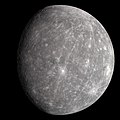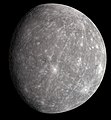Ngokweenkcukacha:Mercury in true color.jpg
Appearance

Size of this preview: 600 × 600 pixels. Other resolutions: 240 × 240 pixels | 480 × 480 pixels | 768 × 768 pixels | 1 040 × 1 040 pixels.
Original file (1 040 × 1 040 pixels, file size: 408 KB, MIME type: image/jpeg)
File history
Click on a date/time to view the file as it appeared at that time.
| Umhla/ixesha | Thumbnail | Dimensions | User | Khawuphawule | |
|---|---|---|---|---|---|
| Ngoku | 08:16, 15 Inyanga kaCanz... 2023 |  | 1 040 × 1 040 (408 KB) | CactiStaccingCrane | Reverted to version as of 10:42, 24 July 2022 (UTC) |
| 08:01, 15 Inyanga kaCanz... 2023 |  | 1 024 × 1 024 (837 KB) | CactiStaccingCrane | Manually merge the original monochrome image with the calibrated color image to eek out more resolution | |
| 10:42, 24 EyeKhala 2022 |  | 1 040 × 1 040 (408 KB) | JCP-JohnCarlo | Make this planet image center | |
| 10:25, 24 EyeKhala 2022 |  | 1 040 × 1 040 (710 KB) | JCP-JohnCarlo | Canvas image | |
| 09:00, 3 Eye Nkanga 2019 |  | 960 × 1 040 (865 KB) | Mirecki | User created page with UploadWizard |
Ukusetyenziswa kwale file
The following page uses this file:
Global file usage
The following other wikis use this file:
- Usage on af.wikipedia.org
- Usage on als.wikipedia.org
- Usage on ar.wikibooks.org
- Usage on as.wikipedia.org
- Usage on be-tarask.wikipedia.org
- Usage on beta.wikiversity.org
- Usage on bn.wikipedia.org
- Usage on bn.wikibooks.org
- Usage on bo.wikipedia.org
- Usage on br.wikipedia.org
- Usage on ca.wikipedia.org
- Usage on ceb.wikipedia.org
- Usage on ckb.wiktionary.org
- Usage on csb.wikipedia.org
- Usage on cs.wikiversity.org
- Usage on cv.wikipedia.org
- Usage on cy.wikipedia.org
- Usage on de.wikipedia.org
- Usage on de.wiktionary.org
- Usage on dty.wikipedia.org
- Usage on dz.wikipedia.org
- Usage on eml.wikipedia.org
- Usage on en.wikipedia.org
- Mercury (planet)
- Terrestrial planet
- The Planets
- Timeline of discovery of Solar System planets and their moons
- List of Solar System objects by size
- List of gravitationally rounded objects of the Solar System
- User:Kwamikagami/sandbox
- NASA
- User:Kazkaskazkasako/Books/Physical sciences
- Talk:Mercury (planet)/Archive 3
- User:Nrco0e/Userboxes
- User:Applekle/sandbox
- Wikipedia:Userboxes/Location/Extraterrestrial
- Talk:The Planets/GA1
- User:Double sharp/Largest Solar System objects
- User:TomMasterReal
- User:Nrco0e/Userboxes/FavMercury
View more global usage of this file.


